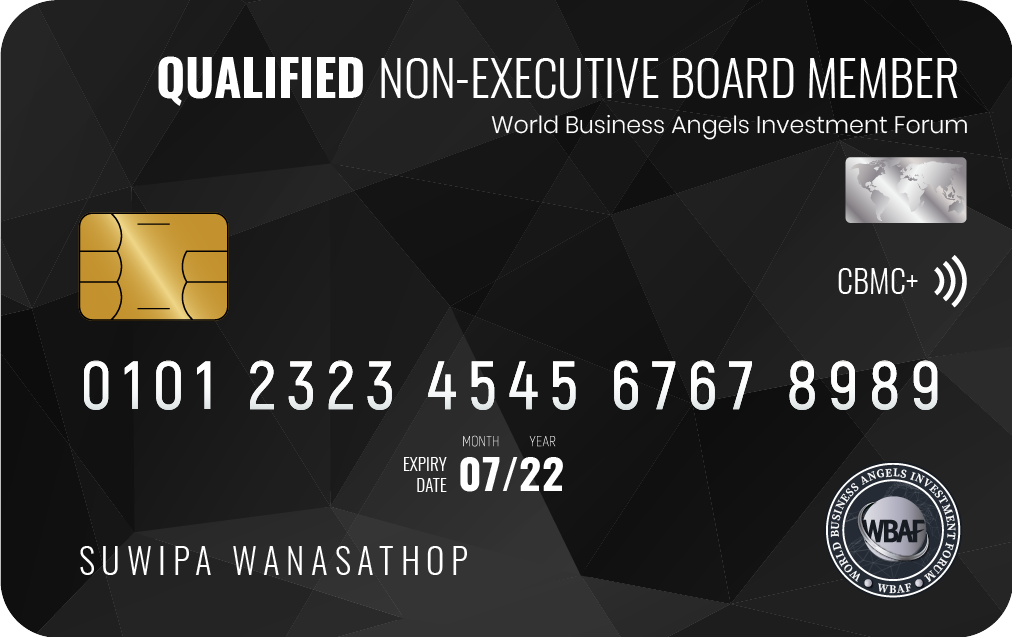

Coming Soon
14 Hours Online + 14 Hours Homework + Proficiency Test
€ 6250
WBAF provides an innovative learning experience to support current and aspiring board members in becoming more aware that this prestigious position in the boardroom should not be taken lightly, as it comes with important fiduciary obligations and considerable personal responsibilities. This course will enable participants to develop a toolkit of productive skills to efficiently channel their own intuitive reasoning, past experiences, and personal competencies towards supervising a company’s management team and achieving corporate strategic objectives. Non-executive directors serve on the board of all types of organizations (private or public sector, joint public/ private enterprises, listed companies, regulated corporations, family-owned businesses, not-for-profit, non- governmental organizations, etc.) that are at different levels of business maturity and operational activity.
The purpose of the course is to equip, empower, and educate board members everywhere. A key objective of the course is to ensure that you avoid the financial and other penalties that can arise if a board engages in poor corporate governance and decision-making. It is ingenious and contemporary style, outlined in eight practical modules, will leave you with an advanced understanding not only of the main statutory responsibilities, but also will provide you with:

The WBAF Business School provides a hybrid learning experience in a multilingual and multi-cultural environment offering (a) online education (b) support from an individualized strategic advisory board, (c) stock exchange meetups and inter-continental study trips, (d) support from a corporate governance and SME support center and (e) proficiency-based qualification and certification.
How Board of Directors generate successful companies?
How to select a good Non-Executive Board Member for your Board?
How can I be a good Non-Executive Board Member?
A boards of directors is the most important key management committee to ensure business success and capability of every company and institution. Non-Executive Board members should be able to develop a long-term strategic business plan for the company, ensuring that the company management can implement the vision, mission, and reach the business targets, while suggesting, and implementing solutions to major problems the company may face in the future.
This module will provide a better understanding of why Board of Directors is important. The module will enable the participants to evaluate and judge who may be a suitable candidate for a Non-Executive Board member for specific institutions.
[discuss working with the executive management team and how the board interacts with them. Might want to discuss the role of Senior Independent Director and board committees e.g. Audit Committee, Nominations Committees, Remuneration Committee, as well as other ad hoc committees]
Presentation by the lecturer: 90 minutes
Responsibilities, Rights, and Duties of a Non-Executive Board Member
Non-Executive Board Members have important duties and responsibilities. They also have rights in the company to execute their duty properly. Every Board Member should know his/her duties and responsibilities in detail and use his/her rights in an efficient manner to lead the company to achieve its goals and objectives.
This module provides detailed information about the distinct types of Non-Executive Board Member duties and responsibilities including “Board Responsibilities,” “Individual Responsibilities,” selection of CEO, working with Committees, and Legal Obligations.
Presentation by the lecturer: 90 minutes
Board Structure, Dynamics, Process, and Operations for good Corporate Governance
for Startup Ventures, Small to Medium Size Companies, Big Companies, Financial Institutions, Banks, Investment Funds, Venture Capital, Wealth Management, Techno parks, Public Institutions and Non-Profit Organizations
The Company boards of today and tomorrow are serious, professional and manned by experts who have a deep seated belief in the success of the business, its staff and its stakeholders. Never before have boards been held to so much responsibility and accountability. Therefore board members should not just understand the mechanics of a board position, but also how to be effective in their role.
This module provides key take-aways to build up an effective dynamics and structure of Board of Directors, in startup ventures, SMEs - small to medium size companies, big companies, banks, investment funds, venture capital and wealth management companies, techno parks, public institutions and nonprofit organizations.
Presentation by the lecturer: 90 minutes
How to establish, communicate and manage the different types of Board Committees and build effective and efficient relationship with the other board members, shareholders, CEO, public authorities, media, and the other stakeholders?
Every Non-Executive Board Member should know how to manage and communicate with other board members, shareholders, the CEO, public authorities, the media, and the other stakeholders (including staff, customers, suppliers and the local community) A professional, interactive communication with all parties makes the difference better weak and strong value creation for the company, and is therefore vitally important. Not only will mismanagement of the relationship with these parties may damage the company’s performance and reputation, but it will also reflect on your own reputation potentially with long-term ramifications. [In today’s world where news is immediate and spreads rapidly, no Non Executive Board member can afford to avoid taking a professional and considered approach to these issues.
This module will provide the participants with the necessary skills and tactics to build up effective and efficient relationships with their peers and all other stakeholders.
Presentation by the lecturer: 90 minutes
Risk Management, Crises Management, and Technology Management for Non-Executive Board Members
In every business and in every market environment there are many risks that need to be monitored properly to avoid issues that may damage the company’s financial statements, reputation and/or long-term status of a company. Board Members should be able to anticipate the future possible risks that may damage the company and should be able to suggest strategies to avoid or overcome these risks. Board Members may panic when faced with a crisis. Hence having “Crisis Management” skills is a critical factor for the Board. Experience shows that today and more so in the future, success will be lowered or even damaged if companies do not use the latest technologies available. Board members need not only to be able to understand the myriad technology solutions that companies use internal systems such as accounting tools to industry focused technologies, as well as having insights into what technology issues and opportunities are emerging and how these impact not just on the company, but also on the actual responsibilities of the board.
This module will provide the necessary knowledge to Non-Executive Board Members to recognize the financial risks, market risks and operation risks that may generate losses for the company. At the end of this module participants will learn the early warning signals for risk detection and the actions to take to minimize the losses that may be caused by these risks. They will also learn the skills and tactics to manage crises situations in the company and improve their understanding of following recent technology developments in their sector.
Presentation by the lecturer: 90 minutes
The shareholders of a company appoint Board of Director Members to their company and hope that the Board will run the company in line with good corporate governance principles. The first important good corporate governance principle is “Ethical Governance.” Unethical behavior of Board Members cannot be tolerated. Unethical behavior of the Board of Directors spreads the immoral decisions and implementations from top to bottom of the company’s organization. It is the biggest risk any company may face. Therefore, shareholders of a company should appoint Board Members who will comply with “Ethics Code of Conduct.”
This module will cover all the ethical issues that a Non-Executive Board Member may experience during his/her service period. It will enlighten the critical ethical dilemmas of Board Members. Upon completion of this module participants will be able to manage ethical problems any Non-Executive Board Member may encounter and develop the necessary skills to comply with “Ethical Code of Conduct” of the company.
Presentation by the lecturer: 90 minutes
Case Study analysis evaluation and discussion
Ethical Case analysis strengthens the knowledge learned during the course and enables the participants to put the ethical concepts in perspective in real life. Real life Board Room ethics cases will be evaluated and discussed.
This module will help the participants to see how ethical issues, dilemmas and problems may influence a company’s future success if Board of Directors cannot address ethical issues properly.
Presentation by the lecturer: 90 minutes
Role Playing “Solving a crises situation in a company”
Role playing will help participants to experience what it is like to be a Non-Executive Board Member. This module will provide an environment to make them experience what real-life situation feels like. It will require a combination of knowledge, experience and skills to be able to contribute positively to the solution and therefore force participants to understand intricacies and complexities of decision-making when faced with problems in the Board Room.
This module will provide exciting real-life role-playing experience which will enable participants to use their knowledge to produce solutions to critical problems. They will gain confidence about the topics they have learned during the course.
Presentation by the lecturer: 90 minutes
The programme concludes with a proficiency test and participants are awarded a professional certificate featuring your proficiency level and a personal WBAF Identity Card. The WBAF Business School awards two kinds of certificates: (a) a professional certificate is issued for successful completion of a programme that concludes with a proficiency test, and (b) a certificate of completion is issued for a course without a proficiency test.